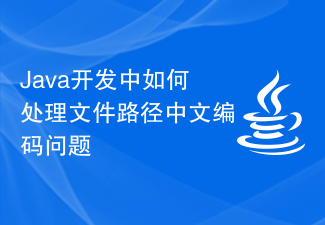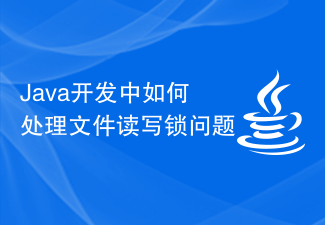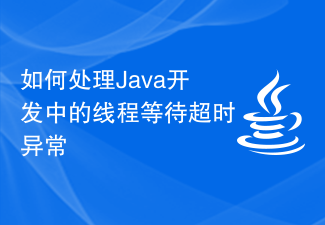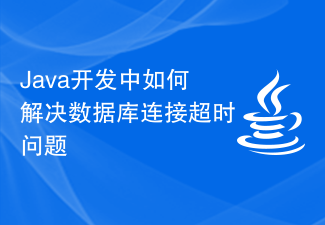 Java
Java javaTutorial
javaTutorial Using Java to develop quality control and quality traceability functions of warehouse management systems
Using Java to develop quality control and quality traceability functions of warehouse management systems
Using Java to develop quality control and quality traceability functions of warehouse management systems
Abstract:
With the rapid development of the logistics industry, warehouse management systems are becoming more and more Receive attention. Quality control and quality traceability are crucial links in the warehouse management system. This article will introduce how to use Java to develop a warehouse management system, focusing on its quality control and quality traceability functions, and providing specific code examples.
Keywords: Java, warehouse management system, quality control, quality traceability
1. Introduction:
The warehouse management system is an indispensable and important part of modern logistics enterprises. Its main The function is to manage the entry and exit of goods, warehouse inventory, and cargo circulation. In order to ensure the quality of goods and avoid safety problems and disputes, the warehouse management system needs to have certain quality control and quality traceability functions.
2. Quality control function:
The quality control function mainly includes monitoring and controlling the quality of goods in the warehouse to ensure that the quality meets standard requirements. The following are the main steps to implement the quality control function:
2.1 Define the quality standards of the goods:
First, we need to define the quality standards of the goods, such as the weight, size, material, etc. of the goods.
2.2 Quality Monitoring:
Secondly, we need to monitor the quality of the goods in the warehouse in real time. Goods can be inspected through instruments and equipment or manually, such as weighing, dimensional inspection, quality inspection, etc.
2.3 Alarm and processing:
If the quality of goods in the warehouse exceeds the standard range, the system should issue an alarm and trigger the corresponding processing mechanism, such as stopping the receipt of the goods and notifying relevant personnel for inspection. wait.
3. Quality traceability function:
The quality traceability function is mainly to track the quality information of the goods. Once a quality problem occurs, it can be quickly traced back to the source, analyze the cause and take corresponding measures. The following are the main steps to implement the quality traceability function:
3.1 Generate a unique identification:
Each goods should generate a unique identification, such as a barcode or serial number, when entering the warehouse. Identification can be used to uniquely identify goods, track goods, and record quality information of goods.
3.2 Quality information storage:
The system should be able to record the quality information of each goods, including purchase time, test results, quality standards, etc.
3.3 Quality traceability:
Once a quality problem occurs, the system should be able to quickly trace it back to the source through identification and view the quality information of the goods to find out the cause of the problem.
4.Java code example:
The following is a simple Java code example that demonstrates how to implement quality control and quality traceability functions in the warehouse management system:
// Goods Class
public class Product {
private String id;
private String name;
// 获得货物标识
public String getId() {
return id;
}
// 设置货物标识
public void setId(String id) {
this.id = id;
}
// 质量检测
public void qualityCheck() {
// 质量检测逻辑
// ...
}}
// Warehouse management class
public class WarehouseManagementSystem {
private Map<String, Product> products = new HashMap<>();
// 添加货物到仓库
public void addProduct(Product product) {
products.put(product.getId(), product);
}
// 质量控制
public void qualityControl() {
for (Product product : products.values()) {
product.qualityCheck();
// 质量控制逻辑
// ...
}
}
// 质量追溯
public Product qualityTrace(String id) {
return products.get(id);
}}
Demonstration of the above code example The basic implementation logic of quality control and quality traceability functions in the warehouse management system is explained. Quality control includes quality inspection and control of goods, while quality traceability quickly finds the quality information of the goods through the unique identification of the goods.
Conclusion:
This article introduces how to use Java to develop a warehouse management system, and focuses on the quality control and quality traceability functions. Through quality control, we can ensure that the quality of goods meets standard requirements; through quality traceability, we can quickly trace back to the source, analyze and solve quality problems. Java code examples for writing quality control and quality traceability functions further demonstrate how to implement these two functions. The quality control and quality traceability functions in the warehouse management system will help improve the operational efficiency and customer satisfaction of logistics enterprises.
The above is the detailed content of Using Java to develop quality control and quality traceability functions of warehouse management systems. For more information, please follow other related articles on the PHP Chinese website!
 如何解决Java开发中的HTTP请求连接被拒绝问题Jun 29, 2023 pm 02:29 PM
如何解决Java开发中的HTTP请求连接被拒绝问题Jun 29, 2023 pm 02:29 PM如何解决Java开发中的HTTP请求连接被拒绝问题在进行Java开发中,经常会遇到HTTP请求连接被拒绝的问题。这种问题的出现可能是由于服务器端限制了访问权限,或是网络防火墙阻止了HTTP请求的访问。解决这个问题需要对代码和环境进行一些调整。本文将介绍几种常见的解决方法。检查网络连接和服务器状态首先,确认你的网络连接是正常的,可以尝试访问其他的网站或服务,看
 Java开发中如何处理文件路径中文编码问题Jun 29, 2023 pm 05:11 PM
Java开发中如何处理文件路径中文编码问题Jun 29, 2023 pm 05:11 PM在Java开发中处理文件路径中的中文编码问题是一个常见的挑战,特别是在涉及文件上传、下载和处理等操作时。由于中文字符在不同的编码方式下可能会有不同的表现形式,如果不正确处理,可能会出现乱码或路径无法识别的问题。本文将探讨如何正确处理Java开发中的文件路径中文编码问题。首先,我们需要了解Java中的编码方式。Java内部使用Unicode字符集来表示字符。而
 Java开发中如何处理文件读写锁问题Jun 29, 2023 am 09:55 AM
Java开发中如何处理文件读写锁问题Jun 29, 2023 am 09:55 AMJava是一种功能强大的编程语言,广泛应用于各种领域的开发中,特别是在后端开发中。在Java开发中,处理文件读写锁问题是一个常见的任务。本文将介绍如何在Java开发中处理文件读写锁问题。文件读写锁是为了解决多线程同时读写文件时可能出现的并发冲突问题。当多个线程同时读取一个文件时,不会产生冲突,因为读取是安全的。但是,当一个线程在写入文件时,其他线程可能正在读
 如何解决Java开发中的URL解码异常Jun 29, 2023 pm 02:07 PM
如何解决Java开发中的URL解码异常Jun 29, 2023 pm 02:07 PM如何解决Java开发中的URL解码异常在Java开发中,我们经常会遇到需要解码URL的情况。然而,由于不同的编码方式或者不规范的URL字符串,有时候会出现URL解码异常的情况。本文将介绍一些常见的URL解码异常以及对应的解决方法。一、URL解码异常的产生原因编码方式不匹配:URL中的特殊字符需要进行URL编码,即将其转换为以%开头的十六进制值。解码时,需要使
 如何处理Java开发中的线程等待超时异常Jun 29, 2023 pm 06:18 PM
如何处理Java开发中的线程等待超时异常Jun 29, 2023 pm 06:18 PM如何处理Java开发中的线程等待超时异常在Java开发中,我们经常会遇到一种情况:当一个线程等待其他线程完成某个任务时,如果等待的时间超过了我们设定的超时时间,我们需要对该异常情况进行处理。这是一个常见的问题,因为在实际应用中,我们无法保证其他线程能在我们设定的超时时间内完成任务。那么,如何处理这种线程等待超时异常呢?下面,我将为你介绍一种常见的处理方法。首
 如何解决Java开发中的JSON解析异常Jun 29, 2023 pm 04:09 PM
如何解决Java开发中的JSON解析异常Jun 29, 2023 pm 04:09 PM如何解决Java开发中的JSON解析异常JSON(JavaScriptObjectNotation)是一种轻量级的数据交换格式,由于其易读性、易于解析和生成等特点,被广泛应用于网络数据传输、前后端交互等场景。在Java开发中,使用JSON进行数据的序列化和反序列化是非常常见的操作。然而,由于数据的结构和格式多种多样,JSON解析异常在Java开发中时常出
 Java开发中如何解决数据库连接超时问题Jun 29, 2023 am 09:40 AM
Java开发中如何解决数据库连接超时问题Jun 29, 2023 am 09:40 AMJava开发中如何解决数据库连接超时问题简介:在Java开发中,处理数据库是非常常见的任务之一。尤其是在Web应用程序或后端服务中,与数据库的连接经常需要进行长时间的操作。然而,随着数据库的规模不断增大和访问请求的增加,数据库连接超时问题也开始变得常见。本文将讨论在Java开发中如何解决数据库连接超时问题的方法和技巧。一、理解数据库连接超时问题在开始解决数据
 如何处理Java开发中的文件上传大小限制问题Jun 29, 2023 pm 03:27 PM
如何处理Java开发中的文件上传大小限制问题Jun 29, 2023 pm 03:27 PM如何处理Java开发中的文件上传大小限制问题随着互联网的发展,文件上传功能在Web开发中越来越常见。然而,由于安全和服务器资源限制等原因,许多应用程序会对文件上传的大小进行限制。本文将介绍在Java开发中处理文件上传大小限制问题的几种方法。一、通过Web服务器进行配置大多数Web服务器(如Apache、Nginx等)都提供了对文件上传大小的配置选项。通过修改


Hot AI Tools

Undresser.AI Undress
AI-powered app for creating realistic nude photos

AI Clothes Remover
Online AI tool for removing clothes from photos.

Undress AI Tool
Undress images for free

Clothoff.io
AI clothes remover

AI Hentai Generator
Generate AI Hentai for free.

Hot Article

Hot Tools

Dreamweaver Mac version
Visual web development tools

VSCode Windows 64-bit Download
A free and powerful IDE editor launched by Microsoft

MinGW - Minimalist GNU for Windows
This project is in the process of being migrated to osdn.net/projects/mingw, you can continue to follow us there. MinGW: A native Windows port of the GNU Compiler Collection (GCC), freely distributable import libraries and header files for building native Windows applications; includes extensions to the MSVC runtime to support C99 functionality. All MinGW software can run on 64-bit Windows platforms.

PhpStorm Mac version
The latest (2018.2.1) professional PHP integrated development tool

SAP NetWeaver Server Adapter for Eclipse
Integrate Eclipse with SAP NetWeaver application server.





